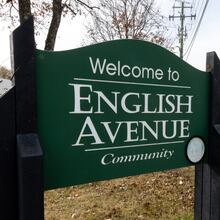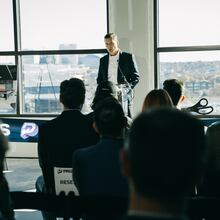Seeking a New Path
WHAT: The Collaborative Leadership Summit, a conference on how to improve Atlanta’s education and culture of innovation.
WHO: More than 50 speakers, many of them entrepreneurs. Featured speaker will be Thomas Friedman, author and New York Times columnist.
WHEN: Sept. 22 and 23
WHERE: Woodruff Arts Center
BEHIND THE EVENT: Organized by Leadership Atlanta with the Atlanta Regional Commission, the Metro Atlanta Chamber and the city of Atlanta. Among the 19 corporate sponsors is the Journal-Constitution.
HOW MUCH: General admission for two days is $275, or $175 just for Monday. Various discounts are also available.
INFORMATION: colabsummit.com/
In a week, more than 50 experts and entrepreneurs will gather in an attempt to jump-start efforts to improve a troubled educational system and an underperforming economy.
But it’s just talk: can a conference change Atlanta?
For sure, the Collaborative Leadership Summit – or (co)lab as organizers call it – has high aspirations, said Pat Upshaw-Monteith, president and chief executive of Leadership Atlanta, which proposed the event.
“Our goal is to inspire participants to collaborate more actively on ideas and solutions that address our shared 21st century challenges, and beyond,” she said.
Set for Sept. 22-23 at the Woodruff Arts Center, the event is organized by Leadership Atlanta with the Atlanta Regional Commission, the Metro Atlanta Chamber and the city of Atlanta. The Atlanta Journal-Constitution is a prime sponsor.
A bevy of speakers — the headliner is author and columnist Tom Friedman — will hold forth on issues such as cultivating innovation and reforming education. Online “labs” will enable attendees at the $275-a-head event to toss around their own ideas.
There is no plan for a formal follow-up, but organizers hope (co)lab can be a catalyst.
“It’s about ideas and getting people motivated,” Upshaw-Monteith said. “Hopefully, people will come out of the conference energized and ready to make changes in the community.”
For metro Atlanta, the idea of brainstorming comes against a backdrop of historical discord: regional collaboration has often been hard to achieve.
There have been successes like the development of Hartsfield-Jackson Airport and the rescue of financially crippled Grady Hospital. There have also been rifts that went unrepaired.
Metro Atlanta leaders have often been at odds with leaders from elsewhere in the state. But even in the region, leaders in city and suburbs often disagreed – especially on transportation and education.
A year ago, a transportation special purpose local option sales tax – TSPLOST – failed badly at the polls.
The campaign for that initiative was led by business leaders. And while the chamber is helping organize (co)lab, only one slated speaker has a chamber position.
"Our goal is to break the pattern of the same people making decisions," Upshaw-Monteith said.
Leading a session on fostering entrepreneurship will be Alan Dabbiere, chairman of Atlanta-based AirWatch, a mobile software company, as well as chair of the chamber’s Technology Leadership Council. He said an array of new faces was a deliberate choice.
“Co-lab is trying to say, let’s not bring out the same people. Not that they didn’t do a great job, not that Atlanta hasn’t done great things. But it is like Wayne Gretzky said, let’s not go to where the puck is, let’s go to where the puck will be.”
While there are many points of view represented, the conference is meant to get a lot of people “pushing in the same direction” – toward growth and innovation, said Dabbiere.
“We need an economy that is diverse and broad-based,” he said. “We can’t have 80 percent of the population delivering pizzas to the other 20 percent. We need a lot of good-paying, tech jobs.”
A conference doesn’t change the economy, but it can move good ideas into the discussions that matter, Dabbiere said. “(Co)lab is taking a focused enough approach to move the needle.”
Conference organizers say they crafted plans for the Atlanta summit after speaking with planners who put together the Aspen Ideas Festival as well as those who work on the two-year-old Chicago Ideas Week – both high-profile, locally-based events.
The Chicago event last year boasted 235 speakers and drew 25,000 people, said Jessica Malkin, executive director. Organizers have come to think of the event as a “think tank” for the city and its citizens, she said.
This time out, the group intends to do more to encourage people to put the ideas into action, something that was not a focus the first two times, Malkin said.
The Aspen Ideas Festival, held in Colorado each summer, is a decade-old offshoot of the Aspen Institute, which was founded just after World War II and is now based in Washington, D.C., said Kitty Boone, vice president for public programs.
Aspen's mission is really not linked to its location, Boone said. "We are not regionally focused at all. I would liken it to a university."
Organizers don’t worry too much about measuring an impact from the festival, Boone said. “What is important is that you introduce people to new ideas. Then what people choose to do with them is up to them.”
A ticket covering half the week-long Aspen Festival is $2,700.
The Atlanta plan is ambitious, if a little vague, said Dane Stangler, research director at the Kansas City-based Kauffman Foundation, which studies and encourages entrepreneurialism.
“The question is, what is it that you want to move the needle on?”
“It is really hard to do a good conference, whether to change culture, instigate something or just present papers. That implies that it is done rarely.”
Perhaps the best example of an effective conference has been Big Omaha, Stangler said.
Over the years, Omaha has seen a surge in its technology economy, entrepreneurial culture and network of start-up capital, Stangler said. “You can’t attribute it all to Big Omaha, but they have certainly played a role.”
Dabbiere agreed that the impact of any conference, no matter how ambitious, is hard to measure. What is most crucial is getting lots of people motivated to making improvements.
“It’s not two months or six months that you see it, it’s 10 years down the road,” he said. “Sooner or later we are going to hit the tipping point. We just can’t give up before.”
About the Author




